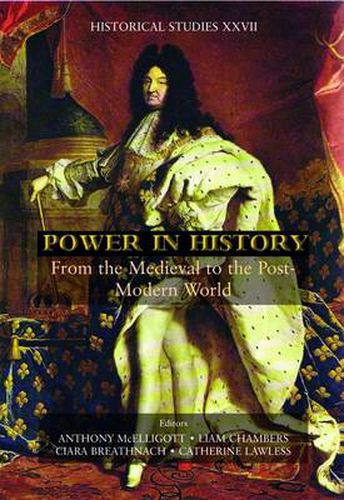Readings Newsletter
Become a Readings Member to make your shopping experience even easier.
Sign in or sign up for free!
You’re not far away from qualifying for FREE standard shipping within Australia
You’ve qualified for FREE standard shipping within Australia
The cart is loading…






This book assembles some of the most exciting scholars working in the field of history to explore the theme of power in history, examining the complexities, controversies, and contradictions of power and its contested environments in relation to warfare, the state, race, religion, gender, class, linguistic and cultural hegemony, symbols and rituals, and visual arts and architecture. It ranges from the medieval period to contemporary times, principally in Ireland and wider Europe, but also extending to North America, Africa and Oceania. The fifteen contributions do not accept ‘power’ as a historical given. Each author addresses the specific context giving rise to different constructions of it and its legitimacy, whether based on violence, political writings and rationalism, religious belief, popular acclamation or visual perception. The collection brings out the different meanings and nuances of power over time and in its different geographical spaces. As the editors argue in their conclusion where they look at the meaning of power in the post-modern age, the findings of this book have a reach beyond the academy and should resonate with all those interested in the exercise of power in the modern world.
$9.00 standard shipping within Australia
FREE standard shipping within Australia for orders over $100.00
Express & International shipping calculated at checkout
This book assembles some of the most exciting scholars working in the field of history to explore the theme of power in history, examining the complexities, controversies, and contradictions of power and its contested environments in relation to warfare, the state, race, religion, gender, class, linguistic and cultural hegemony, symbols and rituals, and visual arts and architecture. It ranges from the medieval period to contemporary times, principally in Ireland and wider Europe, but also extending to North America, Africa and Oceania. The fifteen contributions do not accept ‘power’ as a historical given. Each author addresses the specific context giving rise to different constructions of it and its legitimacy, whether based on violence, political writings and rationalism, religious belief, popular acclamation or visual perception. The collection brings out the different meanings and nuances of power over time and in its different geographical spaces. As the editors argue in their conclusion where they look at the meaning of power in the post-modern age, the findings of this book have a reach beyond the academy and should resonate with all those interested in the exercise of power in the modern world.